by Naomi L. | December 31, 2014 | Blog, Creative Writing |
It’s the last day of 2014, and you know what that means: time for a recap of the year! To celebrate the turn of the year, here’s a brief review of what I’ve learned about writing in 2014. Enjoy, and Happy New Year!

Juggling grad school and a blog is hard work…
I was admitted into a graduate program at the beginning of this year (yay!), and I’m now halfway toward achieving a Master’s degree in Marine Ecology. While I have been enjoying the experience so far (stressful as it may be at times), it also takes away from the time I would otherwise spend writing creatively. Sometimes I have to spend all day at my university, and even when I don’t, there are still scientific papers to read and lab files to organize for my thesis. With everything I have to handle at once, I’ve come to learn a harsh truth: multitasking is hard!
…but miraculously, I can do it.
Despite the challenges of balancing these passions of mine, I’ve still managed to keep up with my creative writing. I haven’t yet fallen behind schedule on my blog posts, and I still stay ahead on ideas for upcoming topics. Let’s hope it stays that way; next year is going to prove even more challenging!
Scientific writing and artistic writing are surprisingly similar…
Whether written for a scientific journal, a literary magazine or a book, prose is prose, and all of it is subject to a basic foundation of rules. Aside from obvious guidelines such as grammar and spelling, scientific papers and fictional stories both have to follow a set structure in order to be complete, that is, they need a clear beginning, middle and end. Both require a ton of editing and proofreading before being released to the public, and when not written well, expect a storm of criticism to rain down shortly after publication.
…yet also very different.
Scientific writing requires that you follow strict formatting rules (so strict, in fact, that one mistake can get your whole paper rejected for publication), while artistic writing offers much more freedom to experiment. Art is also considerably more flexible about getting facts straight than science. In other words, there are plenty of things you can get away with in art that you can’t in science. But more on that subject later.
Writing is and always will be my one true calling.
Whatever I do in my life, there will be times when I seriously doubt if I have what it takes to be successful at it. It’s happened with my singing, with my video editing and even with science. The only exception is writing. Though I’ve dealt with my fair share of doubts and stress when it comes to my writing, I have never once questioned if it’s something I was born to do. I know it is. It’s embedded in the very core of my soul. And it always will be.
So what about you? What have you learned about your writing in 2014?
by Naomi L. | December 29, 2014 | Blog, Word of the Week |
Word: iridescent
Pronunciation: i-ri-DE-sənt
Part of Speech: adjective
Definition: showing luminous colors that seem to change when seen from different angles
Source: Oxford Dictionaries
It’s no secret that I love colors. This was made especially obvious in my vocabulary post about the word “opalescent“. Colors are fun to write about, so it makes sense that I use several different color-themed adjectives in my stories and poems. And among my favorites, after its aforementioned synonym, is “iridescent”.
An “iridescent” object is one with various bright colors that appear to change depending on the angle from which they’re seen. The word was coined around the late 18th century, and comes from the Latin noun iris, which means “rainbow”.
I write about colors so often that I could probably come up with a hundred different examples of how I might use “iridescent” if I tried. A notable instance is in my story “The Silver Queen“, where I used it to describe the colorful scales of dragons. I think the reason I like this word so much is its connection to the image of rainbows, so if you like writing about anything bright and multicolored, “iridescent” is the word for you! Have fun!
What are your thoughts on this word? Any suggestions for future “Word of the Week” featured words?
by Naomi L. | December 26, 2014 | J.C. Wolfe's Writing, Poetry |
My favorite time of year has arrived!
Everyone in the family will be here,
Ready to celebrate the holidays and
Rejoice together over a wonderful
Year gone by and a new one to come.
Chestnuts roast over an open flame,
Holly hangs along the walls, and
Reindeer pull a sleigh across the lawn.
I won’t sleep tonight, knowing
Santa Claus will place gifts under the
Tree decorated with brightly colored lights.
Mistletoe is hung in the hallway as I hear
Angelic voices caroling outside.
Sing of all this blessed holiday cheer!
Hope you’re all having a wonderful holiday season! A belated Merry Christmas to all, and a Happy New Year!
by Naomi L. | December 24, 2014 | Blog, Creative Writing |
Merry Christmas Eve! It’s that time of year again, and what better way for writers to celebrate than indulging in some classic Christmas stories? Continuing from my review of Treasury of Christmas Tales, here’s a list of five Christmas-themed stories I enjoyed in my childhood. Enjoy, and have a very Merry Christmas!
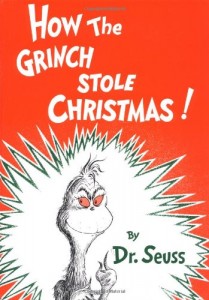 1) How The Grinch Stole Christmas! by Dr. Seuss
1) How The Grinch Stole Christmas! by Dr. Seuss
How The Grinch Stole Christmas! is by far one of my all-time favorite Christmas books, which I’ve already made clear in the review I wrote of it last year. Dr. Seuss’s classic tale of the grumpy Grinch’s quest to ruin Christmas for the happy Whos and his discovery of the true Christmas spirit never fails to warm my heart whenever I read it. We even had the TV special on VHS to watch whenever we felt like indulging in some holiday entertainment with Seuss’s beloved characters. The Grinch is a fun story for children and adults alike, and we love it to this day!
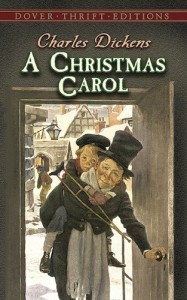 2) A Christmas Carol by Charles Dickens
2) A Christmas Carol by Charles Dickens
Who doesn’t think of A Christmas Carol when remembering favorite Christmas tales? Reprinted and adapted multiple times since its first publication in 1843, Charles Dickens’ tale of holiday-hating miser Ebenezer Scrooge and his change of heart after an encounter with the Ghosts of Christmas may be one of the most famous and influential Christmas books ever written. I had read and watched quite a few adaptations for children when I was a kid, so to this day I remember it as a Christmas favorite!
3) The Nutcracker by E. T. A. Hoffman
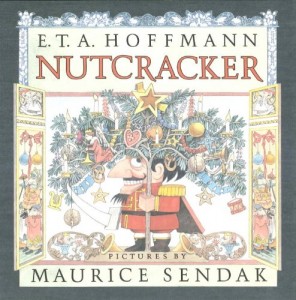 Officially titled The Nutcracker and the Mouse King, the German fairy tale of the toy prince and the little girl who loved him is one that I remember fondly from my childhood, as my mom would read it to us when we were little. Aside from an adapted children’s book, we also had a couple of Nutcracker figures that we’d put out every December with the rest of our Christmas decorations (coincidentally, one of them eventually got a broken jaw, just like the Nutcracker in the story). Though there may not be much to tie this story to the season other than the fact that it takes place around Christmas, I still like to keep The Nutcracker on my list of holiday classics!
Officially titled The Nutcracker and the Mouse King, the German fairy tale of the toy prince and the little girl who loved him is one that I remember fondly from my childhood, as my mom would read it to us when we were little. Aside from an adapted children’s book, we also had a couple of Nutcracker figures that we’d put out every December with the rest of our Christmas decorations (coincidentally, one of them eventually got a broken jaw, just like the Nutcracker in the story). Though there may not be much to tie this story to the season other than the fact that it takes place around Christmas, I still like to keep The Nutcracker on my list of holiday classics!
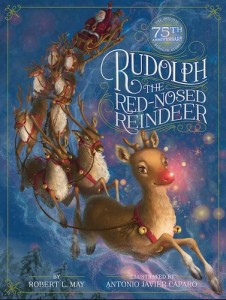 4) Rudolph the Red-Nosed Reindeer by Robert Lewis May
4) Rudolph the Red-Nosed Reindeer by Robert Lewis May
Why not add a little music to the list? Since its first publication in 1939, Rudolph the Red-Nosed Reindeer has been a common favorite Christmas story among children, and an even more popular song. I have fond memories of singing the background chant version with my sisters (“Like a lightbulb!”), sometimes for the whole family to watch during our annual Christmas presentations. Maybe this tale spoke to me for its message about being loved for what makes you special, or maybe the song was just that catchy, but either way, Rudolph has always been a holiday favorite of mine!
5) The Nativity of Jesus (a.k.a. “The Original Christmas Story”)
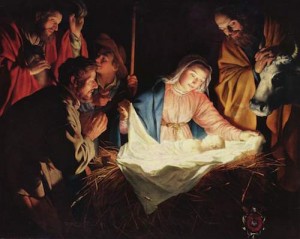
“Adoration of the Shepherds” (Gerard van Honthorst, 1622)
With all the consumerism and stress surrounding the holidays, it’s easy to forget why Christmas is celebrated in the first place. That’s why the birth of Jesus is always on my list of favorite Christmas stories: without it, none of the others would exist! Chronological inaccuracies aside, I’ve always considered the account of Christ’s birth to be an uplifting tale that’s worth remembering every time Christmas comes around. I love spiritual and holiday stories alike, so the nativity of Jesus may very well be my favorite Christmas story of all!
What about you? What are your favorite Christmas stories? Any classics you remember fondly from your childhood?
by Naomi L. | December 22, 2014 | Blog, Word of the Week |
Word: effervescent
Pronunciation: e-fər-VE-sənt
Part of Speech: adjective
Definition:
- giving off bubbles; fizzy
- vivacious and enthusiastic
Source: Oxford Dictionaries
I just love words with a concrete and an abstract definition. This one is a good word to describe anything bubbly, whether it’s a liquid or a person’s attitude. I’m sure we all know someone who’s as “effervescent” as a fizzy drink!
An “effervescent” liquid is one in the process of giving off bubbles. Similarly, an “effervescent” person is someone who’s enthusiastic and lively, presumably in an attractive way. The word is derived from the Latin verb effervescere “to boil up”, which in turn comes from two roots: the preposition ex “out of” and the verb fervescere “to grow hot”.
Much like another word I’ve written about before, I’ve mostly seen “effervescent” in scientific contexts, though I prefer its abstract sense for describing human nature. Note that this word also comes in the verb form “effervesce” for both definitions, which makes it easier to broaden its uses. If you like to write about characters with bubbly personalities, or you have to describe the occasional fizzy liquid, you should have no trouble working “effervescent” into your writing! Have fun!
What are your thoughts on this word? Any suggestions for future “Word of the Week” featured words?








Recent Comments